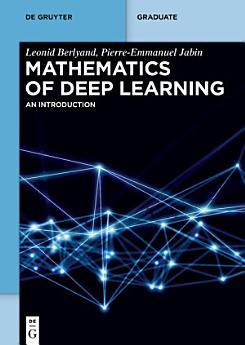Mathematics of Deep Learning: An Introduction
Tentang eBook ini
The material is based on a one-semester course Introduction to Mathematics of Deep Learning" for senior undergraduate mathematics majors and first year graduate students in mathematics. Our goal is to introduce basic concepts from deep learning in a rigorous mathematical fashion, e.g introduce mathematical definitions of deep neural networks (DNNs), loss functions, the backpropagation algorithm, etc. We attempt to identify for each concept the simplest setting that minimizes technicalities but still contains the key mathematics.
Tentang pengarang
Leonid Berland joined the Pennsylvania State University in 1991 where he is currently a Professor of Mathematics and a member of the Materials Research Institute. He is a founding co-director of the Penn State Centers for Interdisciplinary Mathematics and for Mathematics of Living and Mimetic Matter. He is known for his works at the interface between mathematics and other disciplines such as physics, materials sciences, life sciences, and most recently computer science. He has co-authored, Getting Acquainted with Homogenization and Multiscale,Birkhäuser 2018 and Introduction to the Network Approximation Method for Materials Modeling, Cambridge University Press, 2012. His interdisciplinary works received research awards from leading research agencies in the USA, such as NSF, the US Department of Energy, and the National Institute of Health as well as internationally (Bi-National Science Foundation and NATO). Most recently his work was recognized with the Humboldt Research Award of 2021. His teaching excellence was recognized by C.I. Noll Award for Excellence in Teaching by Eberly College of Science at Penn State.
Pierre-Emmanuel Jabin is currently Professor of Mathematics at the Pennsylvania State University since August 2020 previously he was a Professor at the University of Maryland from 2011 to 2020, where he was also director of the Center for Scientific Computation and Mathematical Modeling from 2016 to 2020. Jabin‘s work in applied mathematics is internationally recognized and he has made seminal contributions to the theory and applications of many-particle/multi-agent systems together with advection and transport phenomena. Jabin was an invited speaker at the International Congress of Mathematicians in Rio de Janeiro in 2018.





